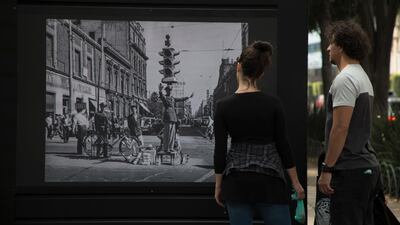The film industry is part of Britain's soft power. It's in good shape, which is a relief, because Britain's hard power doesn't look so healthy. British actors and filmmakers honoured by yesterday's Bafta awards are among the best in the world, their wonderful eccentricities showcasing some of the very peculiar genius of the British people. And right now we could do with a boost. The British like a good laugh. We love our witty writers and comedians but we would prefer the jokesters to be on our screens and cinemas and not, as now, to be representing us in the House of Commons or in negotiations in Brussels. Many of us look at the contortions of the current British government over Brexit with a mixture of derision and despair and recognise that British hard power has taken a big hit militarily, diplomatically and economically. The armed forces have been diminished by budget cuts, costly overseas commitments in Afghanistan and Iraq, and poor recruitment. Britain's diplomatic reputation as a country which can "punch above its weight" has for some years been wishful thinking. And economically there are credible forecasts of post-Brexit low growth near the bottom of the European league.
But in the February gloom, beyond the tragi-comedy of Westminster politics, the Baftas in the Royal Albert Hall were a light shining in the darkness. They could be an indicator, as in previous years, of further successes at the Oscars. As Prince William, one of those involved in the awards presentation and a self-confessed “passionate supporter” of the British film industry, put it, Bafta is “championing creativity” by encouraging and rewarding not just the best of British but also the best and most inventive movie-making in the world.
But more than that, the two big winners highlighted two countries facing the prospect of increasing isolation and gave us gave us at least something to cheer. The Favourite took seven awards, including best British film, best actress and best supporting actress, while Roma picked up four awards, including best film and best director. On the surface, these films appear to have nothing in common. The Favourite is a very English and very colourful costume drama set during the court of Queen Anne in the early 1700s. Roma is set in Mexico, filmed in black and white and, as its director Alfonso Cuaron put it, his film is anything but mainstream as a "story about a domestic worker of indigenous background". But both films are hugely subversive of stereotypes. And both focus on the relationships between very strong women in situations in which their relationships with men are either troubled or non-existent.
The English court of the 18th century is generally portrayed as a place dominated by men, where political scheming and power-plays are a masculine pastime. In this cliched view, women, if they are visible at all, are purely decorative. But The Favourite turns this on its head. The three main characters, Olivia Colman as Queen Anne and her two courtiers Rachel Weisz (who won best supporting actress) and Emma Stone, strive to manipulate each other and the men around them. Colman stole the awards show with a hilariously eccentric acceptance speech, in which she said that all three women deserved the best actress award but since her name was on the trophy, she'd just have to scratch in the names of the others. The story of how the film was made is an epic in itself. It took 20 years. The original script was written by Deborah Davis and her astonishing persistence in the face of rejection finally paid off.
Roma, meanwhile, is equally subversive of stereotypes. The cliched view of Mexico, where the film is set, is that of a land of machismo, colour and passion. Roma is shot in Spanish and an indigenous Mexican language, in black and white. The tone of the film is cool and mundane – the opening scenes are at first puzzlingly slow, and the women in the film are spectators to the dramas around them – yet it is the women who have to pick up all the pieces as the men in various ways disappear. Roma also subverts the traditional way in which films are made and seen by audiences. It was backed by Netflix. That might not seem important to most film fans but the centre of gravity of filmmaking has shifted. Most audiences are likely to see Roma – which deservedly also won the best cinematography award – not on a big screen and with a big audience, but on a television, laptop or tablet with a few others or perhaps even alone.
Cuaron made one subtle political point in his acceptance speech. "We're all connected," he said. This was not "a world of separation", he said; we needed "to show compassion" and cinema had "the power to achieve that". In a world where Mexico and the US contemplate separation by a border wall while Britain contemplates a divorce from the European Union, the Baftas achieve something of profound importance – they help us make connections and see similarities, not differences, at a time of great disunity.
Gavin Esler is a journalist, author and television presenter


